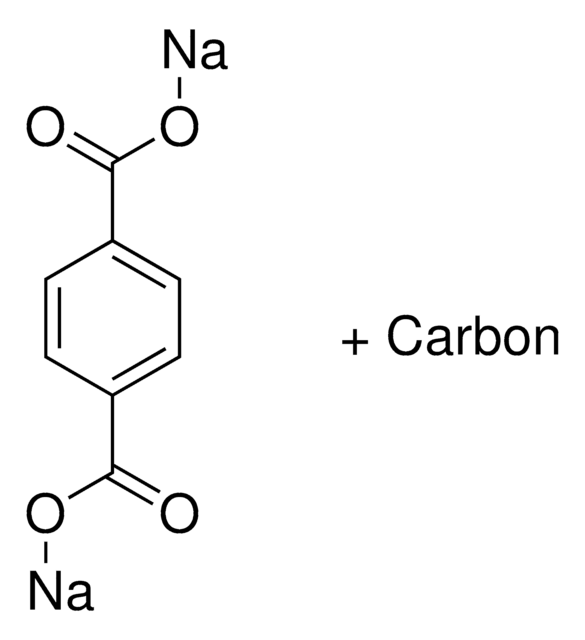8.00762
Terephthalic acid
for synthesis
Synonym(s):
Terephthalic acid, 1,4-Benzenedicarboxylic acid, p-Phthalic acid
About This Item
Recommended Products
grade
synthesis grade
Quality Level
assay
≥98% (acidimetric)
form
crystalline
autoignition temp.
496 °C
potency
>6400 mg/kg LD50, oral (Rat)
mp
402 °C (sublimed)
solubility
15 mg/L (experimental)
density
1.51 g/cm3 at 20 °C
Storage temp.
2-30°C
SMILES string
[O-]C(=O)c1ccc(cc1)C(=O)[O-].[H+].[H+]
InChI
1S/C8H6O4/c9-7(10)5-1-2-6(4-3-5)8(11)12/h1-4H,(H,9,10)(H,11,12)
Inchi Key
KKEYFWRCBNTPAC-UHFFFAOYSA-N
Related Categories
Application
- Biotransformation of p-xylene into terephthalic acid by engineered Escherichia coli: This study explores an alternative production method for terephthalic acid (TPA) that could be less energy-intensive and safer than traditional methods. It reports the successful bioconversion of p-xylene into TPA using genetically engineered E. coli, highlighting a potential sustainable approach to TPA production (Luo & Lee, 2017).
- Synthesis and verification of biobased terephthalic acid from furfural: This research presents a novel synthetic pathway for producing TPA from biomass-derived furfural. It represents a significant step towards sustainable chemical production, providing a greener alternative to petrochemical routes (Tachibana, Kimura & Kasuya, 2015).
- Studies on the solubility of terephthalic acid in ionic liquids: Focused on identifying better solvents for TPA, this study investigates the solubility of TPA in various ionic liquids. The findings could lead to improved processing techniques for TPA in industrial applications (Matuszek et al., 2019).
- Engineering terephthalic acid product from recycling of PET bottles: This study explores the depolymerization of PET into TPA and ethylene glycol, highlighting a sustainable approach to recycle PET waste and reduce reliance on petrochemicals (Lee, Chiu & Lee, 2021).
- Biobased terephthalic acid technologies - a literature review: Reviews various biobased approaches to produce TPA, focusing on the potential of renewable feedstocks to replace traditional petrochemical routes. This comprehensive review discusses different biotechnological and chemical methods to synthesize TPA from bio-based sources (Collias et al., 2014).
Analysis Note
Identity (IR): passes test
Storage Class
11 - Combustible Solids
wgk_germany
WGK 1
flash_point_f
Not applicable
flash_point_c
Not applicable
Certificates of Analysis (COA)
Search for Certificates of Analysis (COA) by entering the products Lot/Batch Number. Lot and Batch Numbers can be found on a product’s label following the words ‘Lot’ or ‘Batch’.
Already Own This Product?
Find documentation for the products that you have recently purchased in the Document Library.
Customers Also Viewed
Our team of scientists has experience in all areas of research including Life Science, Material Science, Chemical Synthesis, Chromatography, Analytical and many others.
Contact Technical Service










